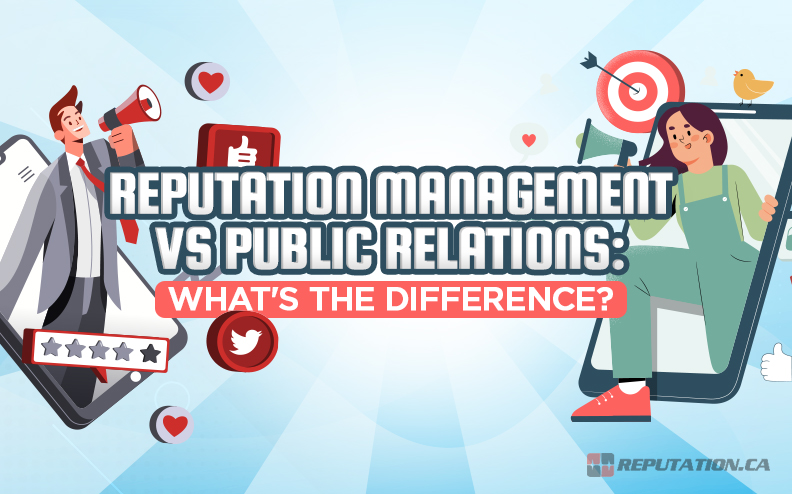Do you know what the difference is between reputation management and public relations?
On the surface, they seem like they’re the same thing. Perhaps public relations is an older institution and deals more with the press, while reputation management is newer and deals with individual reviews. Perhaps they both cross over with one another, and both handle both aspects of the same core concept.
The core concept is, indeed, the same: conveying an image to the public, sculpted by you, to showcase what you want to showcase about yourself. However, both reputation management and public relations go about this in different ways. Let’s discuss those differences.
Difference in Focus
First of all, we can talk about the difference in focus between public relations and reputation management.
As the name might imply, public relations is all about the relationship between your company and the public. PR tends to focus on creating those relationships. PR builds connections with other brands, brand advocates, and journalists who will report the positive content they see about your company. It’s about building up a roster of defenders and ambassadors, about putting a positive spin on coverage, and about fighting negative bias in other publications.
Conversely, reputation management focuses less on the people and more on the content. The staple tools in the reputation management toolkit are based on content marketing and SEO. Reputation management teams develop blog content, guest posts, outreach campaigns, and review campaigns to solicit positive reviews and remove negative reviews.
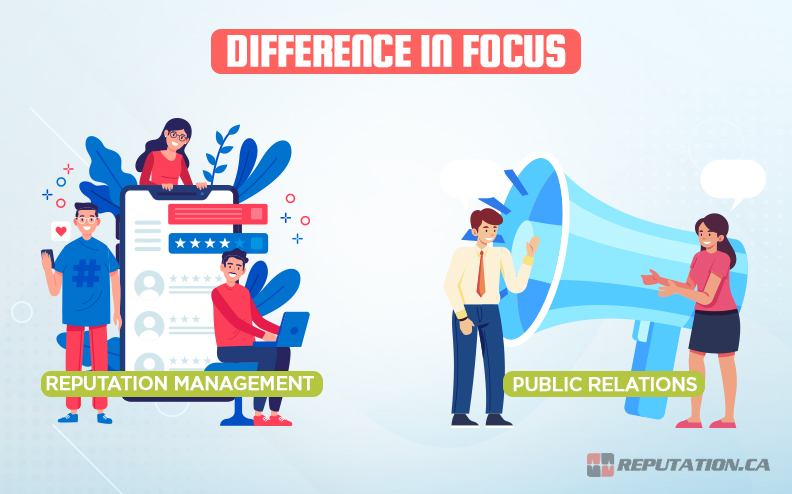
“There are large budgets set aside for marketing expenditures like TV spots, billboards, and online banner ads at large corporations. But for companies and individuals alike, two other promotional activities, public relations, and online reputation management are no less important. In fact, these two functions are becoming increasingly important, and although they are not identical, they do go hand in hand.” – reputation X
Often, reputation management is also described as “online reputation management” because it focuses more on online techniques, SEO, and digital publications. Rarely will reputation management concern itself with television, radio, or print publications, and it doesn’t generally care about conferences, press meetings, or word of mouth. Conversely, public relations is more likely to conduct TV interviews, create television commercials, or host conferences.
Difference in Visibility
To a certain extent, you can define a core difference between PR and RM as how visible the efforts are.
Public relations is usually in the spotlight. In fact, PR firms may take the spotlight explicitly to draw attention away from the company they’re working to protect and bolster. PR is in the limelight, loudly decrying detractors and proclaiming the truth of any matter. It’s all about the media, the press releases, and widespread coverage.
Reputation management, on the other hand, often operates behind the scenes. Some people say “in the shadows” to give it a more negative connotation, but that’s not entirely true. Reputation management efforts are often public, but those efforts are more technical and harder to discern from traditional marketing. Is a blog post about a specific topic aimed at fighting rumors or simply for marketing purposes?
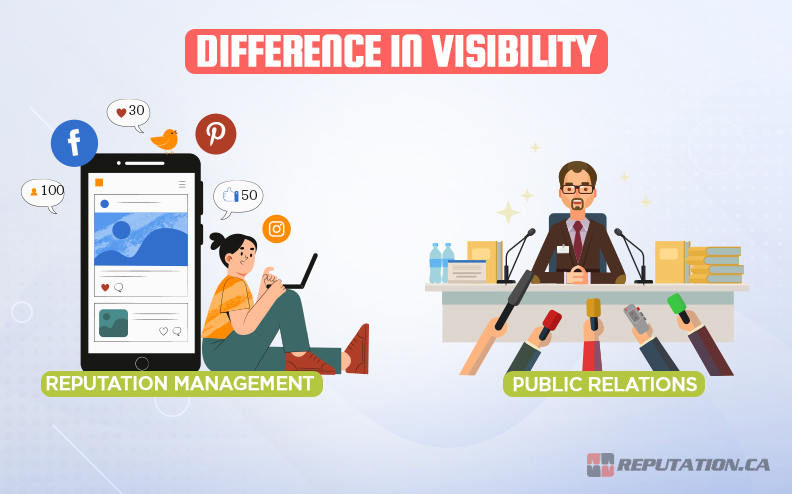
Reputation management uses tools like SEO, as well as built-in reporting features to remove fake and poor content posted on other sites. It sculpts reputation by suppressing the bad and enhancing the good, often using third-party tools and platforms to do it.
This is not to say that reputation management is invisible. One of the core focuses of reputation management is customer service via reviews. Identifying negative reviews and reaching out to the people who posted them, offering to help with the issue, and making things right, is a critical component of reputation management. When done right, customers who left negative reviews can be enticed to change those reviews into middling or positive reviews, which is a net benefit. And, of course, if a negative review is identified as fake, it can be removed or, failing that, refuted publicly with evidence.
Difference in Channels
We’ve already mentioned this one to a certain extent, but there’s a major difference between PR and RM in terms of the channels they use.
Public relations often use the press and media as their primary means of operation. They talk to journalists, either directly with 1:1 contact and connections or using broad-spectrum press releases. They go on TV news programs as company representatives to argue their case. They might use the internet for press release distribution or to create microsites that focus on specific issues and topics.
Reputation management firms, on the other hand, usually use more “personal” tools. They create blogs and blog posts for the company. They perform guest post outreach to write content on editorial channels of other sites, ranging from small industry publications to major sites like Forbes. They also focus heavily on user reviews, whether it’s through sites like Yelp or Google or through reviews and testimonials aggregated on the business’s website itself.
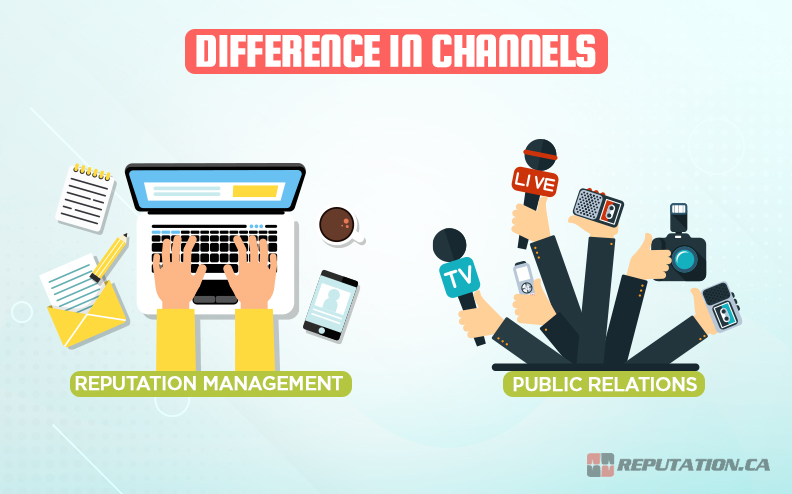
There’s a lot of crossovers here, of course. Public relations firms often use many of the same large publications that reputation management firms use, and they may come at the same publication from different angles using different representatives. This helps promote comprehensive coverage of an issue, refuting criticism from multiple angles for a more robust final outcome.
Difference in Media
Something we’ve touched on above is the difference in media formats used by PR and RM companies.
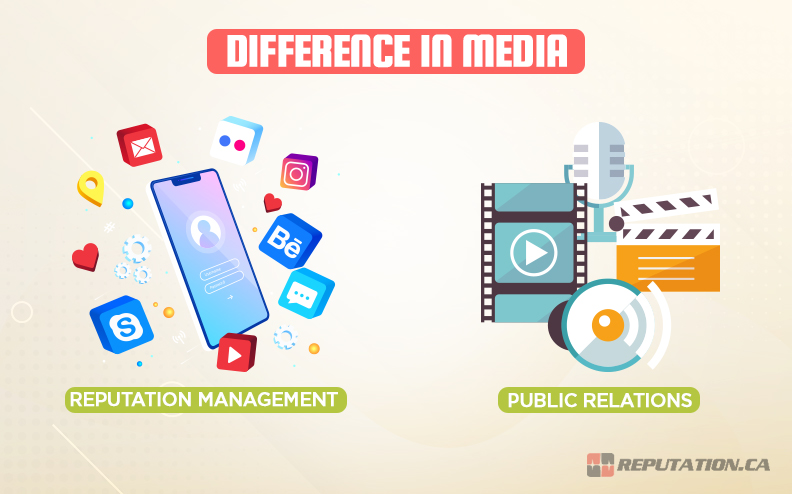
Public relations is a very old institution; indeed, perhaps one of the oldest. For as long as there have been people in positions of power, there have been efforts to sculpt the reputations of those people. PR, then, existed long before the internet and has developed a range of techniques and tools to use in traditional media channels. Whether it’s in-person conferences, press interviews, newspapers, magazines, television, or radio, PR can handle it. PR can also use many of those same techniques on internet-based channels; after all, how much difference is there between news coverage in a magazine versus news coverage on Forbes.com or coverage on YouTube versus coverage on TV?
Reputation management is usually considered to be online-only. In fact, many people consider it the online subset of general PR. It focuses on online channels like blog posts, online videos, reviews, and testimonials. It specializes in these channels since they are some of the most relevant channels to modern businesses and individuals.
Difference in Targeting
In a sense, you can consider public relations to be a one-to-many marketing channel, while reputation management is often one-to-one. What do we mean?
PR companies often engage in broad-spectrum releases. A single press release might be sent out to dozens or hundreds of publications, journalists, and news sites. It’s one piece of content aimed at a larger audience. The same goes for many channels like TV interviews or commercials; a PR firm creates one piece of media, one speech, one interview, which is then broadcast to a large audience, repeated across different media, and echoed through other publications.
Reputation management is often more of a one-to-one format. That’s not to say that it doesn’t reach a larger audience, but rather that it does so by focusing on one location. The primary example is the difference between a press release and a guest post. One press release from a PR firm can be published on a hundred different websites. A single piece of content marketing outreach is published on one website to provide unique value. PR reaches a larger audience with less fluency or nuance, while RM reaches a smaller audience with greater detail and nuance.
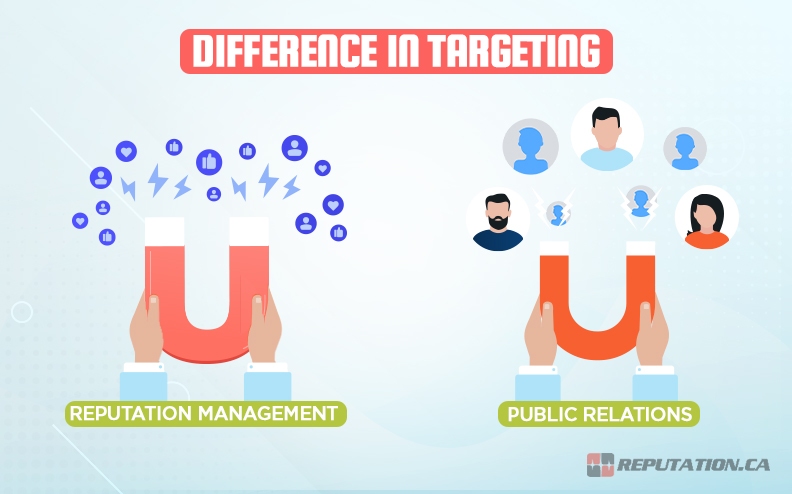
Even with review management, reputation management companies are usually working on a more one-to-one basis. Each individual review is treated as its own case and its own issue and is handled with the appropriate outreach and customer service efforts or with processing through a removals report.
Difference in Tactics
One of the largest differences between public relations and reputation management is the difference in focus and tactics they use.
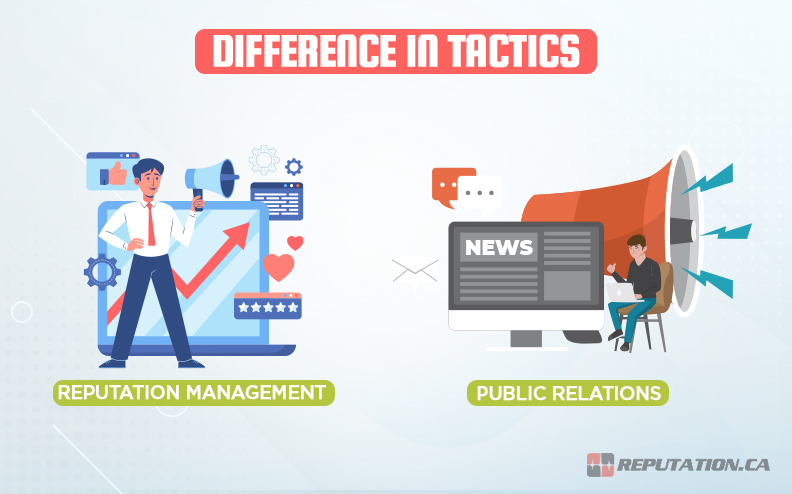
In many instances, the focus of a public relations firm is to drown out the negatives by shouting the positives. A company like Nestle, seeing criticism for their employment practices or their handling of water rights, might downplay those issues and heavily promote the validity of their contracts, the treatment of their employees (even if the information is cherry-picked) and refutation testimonials from individuals close to the source.
Compare this to how reputation management handles reviews. A reputation management company will often try to get negative reviews removed, either as fake or as handled.
Of course, reputation management will also try to solicit the positive, while public relations will also try to remove the negative. It tends to vary depending on the situation, so there’s a lot of crossover between the two in this realm.
Difference in Reputation
PR is often seen, at least by many people, as an underhanded way to lie to the public. There’s an undercurrent of unethical behavior in PR, even if the PR firm never engages in underhanded behavior at all. Some people will always assume the worst, that a PR firm pays off people to say what they want to be said, that they use character assassination (or even real assassination, in some conspiracies) to remove detractors.
Of course, there’s some truth to this. Throughout history, there have always been underhanded dealings in any industry. Have there been assassinations? Sure. Are you going to buy an assassination from a PR firm? Of course not. Modern PR is more about information management than, shall we say, personnel management.
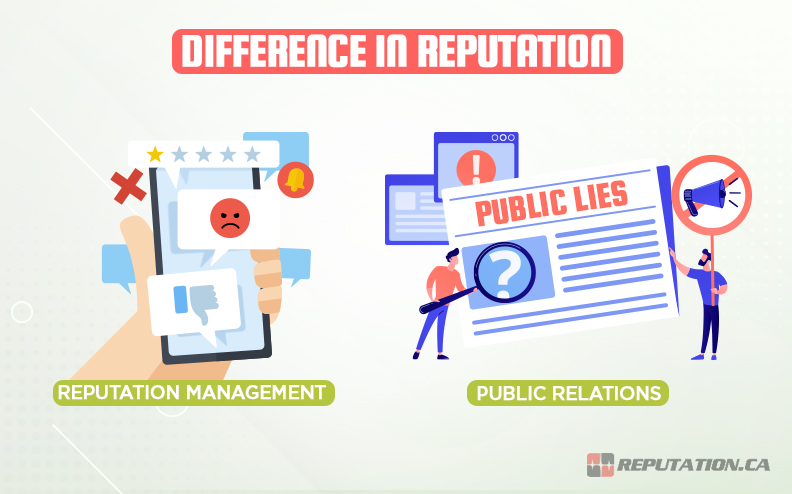
Reputation management has a similarly negative reputation, but for a different reason. Rather than removing negative criticism by silencing opposition, a reputation management firm gets negative content removed. Some people will loudly proclaim that a reputation management company suppresses free speech and that they remove negative content even though it’s legitimate. The truth is, most review sites and third-party sites do not allow the removal of content simply because it’s negative. As such, reputation management companies are often quite legitimate, working with angles like the removal of astroturfed content and handling legitimate customer service outreach to improve relations.
Is There Really a Difference?

As you’ve been reading this, you may have noticed that a lot of the differences between public relations and reputation management come down to semantics.
The truth is, there’s a lot of shared responsibilities and similar techniques between the two industries. They both have the same goal, and they both use similar methods, via similar channels, using similar tools. Different firms offer different services within these constraints, but the end goal is still the same.
“If you question the need for PR and ORM, consider this – PR allows you to generate goodwill and establish a healthy relationship with the figurative, friendly dog at your front door. ORM, on the other hand, can protect your reputation from the hungry wolves who are standing by the back door just waiting to take a bite out of your currently intact public perception.” – UpCity
Some people consider PR to be the overall industry, while RM is a subset of PR. Others consider them to be two sides of the same coin. Either way, they’re similar in many ways, and the differences serve to highlight service packages and price points more than they do a difference in ethos or methodology.
Which One Should You Choose?
If your business is struggling with negative reviews, a poor reputation, bad media coverage, or an emerging crisis, which should you go with?
Usually, the answer is simple: do both. Reputation management is best for rebuilding after the fact, sculpting ongoing awareness and reputation, and handling small-scale issues. Public relations is more useful for emerging crises, large-scale problems, and broad coverage. They both cover different aspects of the situation, so your company can put both to good use.

Our Canada-based firm, for example, leverages both reputation management and public relations techniques as the situation demands. Both are equally valid and can be equally useful depending on your needs. Your best bet is to discard the definitions entirely and simply contact us to work out what exactly you need.




